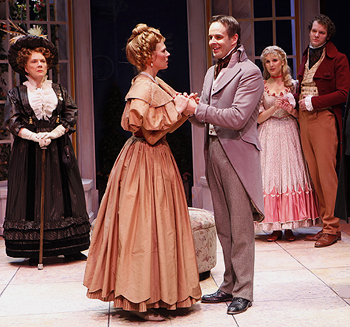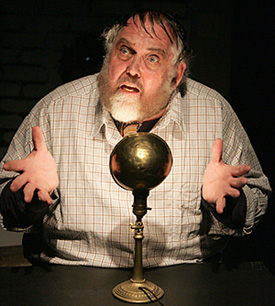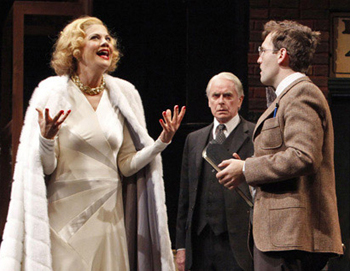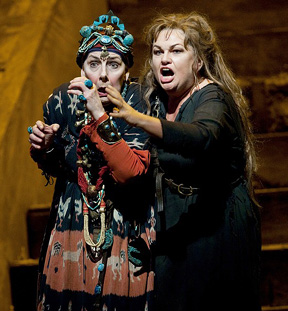[Broadway Ad Network]
[Broadway Ad Network]

TICKET / INFO
- StudentRush
- New York Show Tickets
- Givenik.com
- Telecharge.com
- Ticketmaster.com
- Group Sales Box Office
- Frugal TheaterGoer
- Broadway for Broke People
- Playbill's Rush/Lottery/SR
- Seating Charts
COMMUNITY
NEWS
- Back Stage
- Bloomberg
- Broadway.com
- BroadwayWorld
- Entertainment Weekly
- NYTheatre.com
- New York Magazine
- The New York Daily News
- The New York Post
- The New York Times
- The New Yorker
- Newsday
- NiteLife Exchange
- Playbill
- Show Business Weekly
- The Star-Ledger
- Talkin'Broadway
- TheaterMania.com
- Time Out New York
- American Theatre Magazine
- Theatre Development Fund (TDF)
- Best of Off-Broadway
- The Village Voice
- Variety
- The Wall Street Journal
- Journal News
REVIEWS
- The New York Times
- Variety
- New York Post
- NY1
- Aisle Say
- CurtainUp
- DC Theatre Scene
- Show Showdown
- Stage and Cinema
- StageGrade
- Talk Entertainment
- TotalTheater.com
- Off-Off Broadway Review
- TheaterOnline.com
- TheaterScene.net
- TheaterNewsOnline.com
WEST END
- The Stage
- 1st 4 London Theatre Tickets
- Book Your Theatre Tickets
- Compare Theatre Tickets.co.uk
- Theatre.com
- Whatsonstage.com [UK]
- ATW - London
- Musical Stages [UK]
- Albemarle of London
- Londontheatre.co.uk
- Google News
- Show Pairs
- ILoveTheatre.com
- The Official London Theatre Guide
- UK Tickets
BOSTON
CHICAGO
LA/SF
COLUMNS
- Peter Bart
- Andrew Cohen
- Ken Davenport
- Tim Dunleavy
- Peter Filichia
- Andrew Gans
- Ernio Hernandez
- Harry Haun
- Chad Jones
- Chris Jones
- James Marino
- Joel Markowitz
- Matthew Murray
- Michael Musto
- Ellis Nassour
- Tom Nondorf
- Richard Ouzounian
- Michael Portantiere
- Rex Reed
- Michael Riedel
- Frank Rizzo
- Richard Seff
- Frank Scheck
- Mark Shenton
- John Simon
- Robert Simonson
- Steve on Broadway (SOB)
- Steven Suskin
- Terry Teachout
- Theater Corps
- Elisabeth Vincentelli
- Hedy Weiss
- Matt Windman
- Linda Winer
- Matt Wolf
PODCAST
RADIO
TV
- Theater Talk
- BlueGobo.com
- Classic Arts Showcase
- American Theatre Wing Seminars
- Women in Theatre
- NY1
- WCBS [2]
- WNBC [4]
- FOX [5]
- WABC [7]
- WWOR [9]
- WPIX [11]
- Channel 13
- Hulu
- YouTube
AWARDS
- Tony Central
- Oscar Central
- Tony Awards
- Drama Desk Awards
- The Drama League Awards
- Lortel Awards
- Academy Awards
- Emmy Awards
- Grammy Awards
- GoldDerby
DATABASE
- Internet Broadway Database
- Internet Off-Broadway Database
- Internet Movie Database
- Internet Theatre Database
- Musical Cast Album Database
- [CastAlbums.org]
- Show Music on Record Database (LOC)
- CurtainUp Master Index of Reviews
- Musical Heaven
- StageSpecs.org
ROAD HOUSES
- Gammage [AZ]
- Golden Gate [CA]
- Curran [CA]
- Orpheum [CA]
- Community Center [CA]
- Civic [CA]
- Ahmanson [CA]
- Pantages [CA]
- Temple Hoyne Buell [CO]
- Palace [CT]
- Rich Forum [CT]
- Shubert [CT]
- Bushnell [CT]
- Chevrolet [CT]
- Broward Center [FL]
- Jackie Gleason [FL]
- Fox [GA]
- Civic Center [IA]
- Cadillac Palace [IL]
- Ford Center/Oriental [IL]
- The Bank of America Theatre [IL]
- Auditorium Theatre of Roosevelt University [IL]
- Kentucky Center [KY]
- France-Merrick [MD]
- Colonial [MA]
- Wilbur [MA]
- Charles [MA]
- Wang [MA]
- Wharton Center [MI]
- Whiting [MI]
- Fisher [MI]
- Masonic Temple [MI]
- Orpheum, State, and Pantages [MN]
- Fabulous Fox [MO]
- New Jersey PAC [NJ]
- Auditorium Center [NY]
- Proctors [NY]
- Shea's PAC [NY]
- BTI Center [NC]
- Blumenthal PAC [NC]
- Schuster PAC [OH]
- Playhouse Square [OH]
- Aronoff Center [OH]
- Ohio [OH]
- Victoria Theatre [OH]
- Birmingham Jefferson [OH]
- Merriam Theater [PA]
- Academy of Music [PA]
- Benedum Center [PA]
- Providence PAC [RI]
- Orpheum [TN]
- Hobby Center [TX]
- Music Hall [TX]
- Bass Hall [TX]
- Paramount [WA]
- Fox Cities PAC [WI]
- Marcus Center [WI]
- Weidner Center [WI]
FESTIVALS
- The New York International Fringe Festival
- The American Living Room Festival
- Summer Play Festival
- The New York Musical Theatre Festival
- Adirondack Theatre Festival
- NAMT: Festival of New Musicals
SPECIAL
- BC/EFA: Broadway Cares / Equity Fights AIDS
- The Actors' Fund
- Stage Directors and Choreographers Foundation
EDUCATION
- Google Shakespeare
- Actor Tips
- AACT
- ArtSearch
- Broadway Classroom
- Broadway Educational Alliance
- Camp Broadway
- Great Groups - New York Actors
- Theatre Communications Group (TCG)
- Theatre Development Fund (TDF)
- Off-Broadway Theater Information Center
UNIONS/TRADE
- AEA
- SAG
- AFTRA
- AGMA
- The League
- APAP
- Local 1
- ATPAM
- IATSE
- AFM
- AFM - Local 802
- Treasurers & Ticket Sellers Union
- DGA
- Dramatists Guild
- USA 829
- WGA, East
- WGA, West
- SSD&C
- AFL-CIO
- League of Professional Theatre Women
NYC NON-PROFITS
- Cherry Lane Theatre
- City Center
- Drama Dept.
- Ensemble Studio Theater
- Jean Cocteau Rep.
- Lark
- Lincoln Center Theater
- Lincoln Center for the Performing Arts
- Lucille Lortel Foundation
- Manhattan Theatre Club
- MCC
- Mint
- Pearl Theatre Company
- Public Theater
- Roundabout
- Second Stage
- Signature
- The Vineyard Theatre
- The York Theatre Company
REGIONAL
- Actors Theatre
- Alabama Shakespeare Festival
- Alley Theatre
- ACT
- American Musical Theatre in San Jose
- American Repertory
- Arena Stage
- Barrington Stage Company
- Bay Street Theatre
- Berkeley Rep
- Casa Manana
- Chicago Shakespeare Theater
- Cincinnati Playhouse
- CTC
- Dallas Summer Musicals
- Dallas Theater Center
- Denver Center
- George Street
- Goodman
- Guthrie
- Goodspeed
- Hartford Stage
- Hudson Stage Company
- Theatre de la Jeune Lune
- Kennedy Center
- La Jolla
- Long Wharf
- Lyric Stage
- Mark Taper Forum
- McCarter
- New Jersey Rep
- North Shore
- Old Globe
- Ordway
- Oregon Shakespeare
- Paper Mill
- Prince Music Theater
- The Rep (St. Louis)
- Sacramento Music Circus
- San Francisco Mime Troupe
- Seattle Rep
- Shakespeare Theatre Co. (DC)
- The Shakespeare Theatre of New Jersey
- South Coast Rep
- Steppenwolf
- Theater of the Stars (GA)
- Theater J (DC)
- Theater Under the Stars (TX)
- Trinity Rep
- Two River Theater Company
- Utah
- Victory Gardens
- Westport
- Williamstown
- Yale Rep
KEWL
Follow Spot
by Michael Portantiere
Once in Love With Ernest
-

Once in Love With Ernest
Some years ago, I was lucky enough to attend the Irish Rep's excellent production of Oscar Wilde's The Importance of Being Earnest, which boasted a dream cast headed by Eric Stoltz, Melissa Errico, and the great Nancy Marchand as a well-nigh-definitive Lady Bracknell. I'm happy to tell you that the company is now holiday-gifting us with an equally praiseworthy revival of Ernest in Love, the 1960 Off-Broadway musical based on the play.
On the basis of this production, the musical deserves to be better known and more frequently revived than it is. Although the score (music by Lee Pockriss, lyrics by Anne Croswell) is not terribly distinguished, it's utterly charming and appropriate to the tone of the original. Croswell's book is exemplary in condensing Wilde's text while retaining all of his "greatest hits" bon mots, and the song placement is skillful. Rest assured, there is a song about the notorious "handbag" -- and the creators even found a place for an honest-to-goodness, non-ironic love duet in Act II! Considering the huge potential pitfalls inherent in adapting Wilde to the musical stage, Ernest in Love is an all the more impressive effort.
The Irish Rep production is felicitously cast, with Noah Racey as Jack (a.k.a. Ernest), Annika Boras as Gwendolen, Ian Holcomb as Algernon, and the adorable Katie Fabel as Cecily. As the imperious but hilarious Lady Bracknell, Beth Fowler takes full charge of a role that's completely different from anything I've seen her do before. Charlotte Moore directs the proceedings with just the right touch; the four-piece chamber orchestra sounds lovely as led by conductor/keyboardist Mark Hartman; and the sets, costumes, and lighting, respectively by James Morgan, Linda Fisher, and Brian Nason, put the current Broadway revival of A Little Night Music to shame.
**********************

Zero Hour, written by and starring Jim Brochu -- and directed by Piper Laurie! -- is just as great as I'd heard it was from everyone I know who saw it before I did. This little slice of the great actor Zero Mostel's life is tremendously entertaining, and it further proves my contention that one-person shows are almost always of the highest quality (because they're so difficult to pull off that they tend to be written and performed only by exceptionally talented people who REALLY know what they're doing.)
Indeed, the only real question about Zero Hour is: Which is better, the writing or the performance? Let's call it a draw. Mostel was a larger-than-life presence in terms of both his rotund physique and his mercurial personality; Brochu is almost a dead ringer for the man as he looked in his later years, and his acting ability is such that he captures the man to a T.
The piece itself is a fascinating, informative, alternately hilarious and moving monologue that recaps some of the high- and low-points in Mostel's life and career, including his suffering (and that of his friends) due to the heinous blacklisting of the McCarthy era, the horrendous bus accident that almost claimed one of his legs, and his brilliant comeback(s) in A Funny Thing Happened on the Way to the Forum, Fiddler on the Roof, and The Producers -- a movie he claims to have hated. Zero Hour continues in the Theater at St. Clement's through January 31. Don't miss it!
********************
I'm sorry I didn't catch up with the Mint Theater Company's thoroughly satisfying production of the obscure Maurine Dallas Watkins play So Help Me God! until very late in the show's limited run at the Lucille Lortel Theatre, but I didn't want to let it go without saying "bravo" to the company.
Written by the woman who is best known for having penned the play Chicago (upon which the world-famous musical is based), So Help Me God! was to have been produced on Broadway in 1929-30, but those plans were scuttled by the Depression (the first one). The plot has been compared to that of All About Eve, and there are definite similarities, but also major differences. For one thing, in this play, the stage star who's the Margo Channing counterpart is a hard-core evil, conniving, back-stabbing bitch, whereas the understudy is a far more sympathetic individual than Miss Eve Harrington.
At any rate, Kristen Johnston was absolutely fabulous as the despicable star, and Anna Chlumsky was perfect as "the kid, junior." Other standouts in director Jonathan Bank's top-drawer, first-rate production were Catherine Curtin, John Windsor-Cunningham, Allen Lewis Rickman, and Brad Bellamy. Bill Clarke's sets, and Clint Ramos's costumes were far more elaborate than anyone would have dreamed to hope for in a production at this level. Cheers to everyone involved.
********************

"Well! Something light and joyful for the holidays!" Thus did a friend of mine comment sarcastically when I told him that I'd be attending the Metropolitan Opera production of Richard Strauss's Elektra just a couple of weeks before Christmas. Like the Sophocles play on which it's based, the opera features two murders, and it ups the ante by adding a massive, fatal heart attack (or something to that effect) for the heroine. Not your typical fare for this festive season of the year, when audiences are more inclined toward sugar-plum fairies, elves, leggy Rockettes, etc,
But, of course, a superb presentation of even the grimmest piece is welcome any time of year, so I'm glad I got to experience Elektra as brilliantly conducted by Fabio Luisi, with the astonishing Met debutante Susan Bullock as Elektra and Deborah Voigt returning to one of her greatest roles, Chrysothemis. Add a magnificently sung, thrillingly acted portrayal of Klytamnestra by Felicity Palmer (pictured at left, with Bullock) and you have music drama of the highest order.
A word about the brilliance of Jurgen Rose's set design for this Otto Schenk production, which debuted in 1992: Aside from evoking ancient Mycenae, the set is notable for towering walls that serve as huge sound reflectors, helping to project the singers' voices out into the house with such volume and clarity that they are never swamped by Strauss's often fierce orchestrations. Smartly done!
Published on Monday, December 21, 2009
Michael Portantiere has more than 30 years' experience as an editor and writer for TheaterMania.com, InTHEATER magazine, and BACK STAGE. He has interviewed theater notables for NPR.org, PLAYBILL, STAGEBILL, and OPERA NEWS, and has written notes for several cast albums. Michael is co-author of FORBIDDEN BROADWAY: BEHIND THE MYLAR CURTAIN, published in 2008 by Hal Leonard/Applause. Additionally, he is a professional photographer whose pictures have been published by THE NEW YORK TIMES, the DAILY NEWS, and several major websites. (Visit www.followspotphoto.com for more information.) He can be reached at [email protected]
Why are you looking all the way down here?
For more articles by Michael Portantiere, click the links below!
Previous: Hugh Jackman and Daniel Craig: Gypsies of the Year
Next: One More Week of Musical Theater Heaven
Or go to the Archives
[Broadway Ad Network]
[Broadway Ad Network]

If you would like to contact us, you can email us at feedback@
broadwaystars.com
[Broadway Ad Network]
[Broadway Ad Network]

- July 15: Harry Connick, Jr. in Concert on Broadway - Neil Simon
- Sept. 28: Brief Encounter - Studio 54
- Sept. 30: The Pitmen Painters - Samuel J. Friedman Theatre
- Oct. 3: Mrs. Warren's Profession - American Airlines Theatre
- Oct. 7: Time Stands Still - Cort Theatre
- Oct. 12: A Life In The Theatre - Schoenfeld Theatre
- Oct. 13: Bloody Bloody Andrew Jackson - Bernard Jacobs Theatre
- Oct. 14: La Bete - The Music Box Theatre
- Oct. 21: Lombardi - Circle In The Square
- Oct. 25: Driving Miss Daisy - John Golden Theatre
- Oct. 26: Rain - A Tribute To The Beatles On Broadway - Neil Simon Theatre
- Oct. 31: The Scottsboro Boys - Lyceum Theatre
- Nov. 4: Women On The Verge Of A Nervous Breakdown - Belasco Theatre
- Nov. 9: Colin Quinn Long Story Short - Helen Hayes Theatre
- Nov. 11: The Pee-Wee Herman Show - Stephen Sondheim Theatre
- Nov. 13: The Merchant of Venice - The Broadhurst Theatre
- Nov. 14: Elf - Al Hirschfeld Theatre
- Nov. 18: A Free Man Of Color - Vivian Beaumont Theater
- Nov. 21: Elling - Ethel Barrymore Theatre
- Dec. 9: Donny & Marie: A Broadway Christmas - Marquis Theater
- Jan. 13: The Importance of Being Earnest - American Airlines Theatre
- Mar. 3: Good People - Samuel J. Friedman Theatre
- Mar. 6: That Championship Season - Bernard B. Jacobs Theatre
- Mar. 11: Kathy Griffin Wants a Tony - Belasco
- Mar. 17: Arcadia - Barrymore Theatre
- Mar. 20: Priscilla Queen Of The Desert The Musical - The Palace Theatre
- Mar. 22: Ghetto Klown - Lyceum Theatre
- Mar. 24: The Book Of Mormon - Eugene O'Neill Theatre
- Mar. 27: How To Succeed In Business Without Really Trying - Al Hirschfeld Theatre
- Mar. 31: Bengal Tiger at the Baghdad Zoo - Richard Rodgers Theatre
- Apr. 7: Anything Goes - Stephen Sondheim Theatre
- Apr. 10: Catch Me If You Can - The Neil Simon Theatre
- Apr. 11: The Motherf**ker with the Hat - Gerald Schoenfeld Theatre
- Apr. 14: War Horse - Vivian Beaumont Theater
- Apr. 17: Wonderland: A New Alice. A New Musical Adventure. - Marquis Theatre
- Apr. 19: High - Booth Theatre
- Apr. 20: Sister Act - The Broadway Theatre
- Apr. 21: Jerusalem - Music Box
- Apr. 24: Born Yesterday - Cort Theatre
- Apr. 25: The House of Blue Leaves - Walter Kerr Theatre
- Apr. 26: Fat Pig - Belasco Theatre
- Apr. 27: Baby It's You! - Broadhurst Theatre
- Apr. 27: The Normal Heart - Golden Theater
- Apr. 28: The People in the Picture - Studio 54
- Apr. 28: The End of The Season
- Jun. 12: The 65th Annual Tony Awards - Beacon Theatre
- June 14: Spider-Man, Turn Off The Dark - Foxwoods Theater
- June 21: Master Class - Samuel J. Friedman
